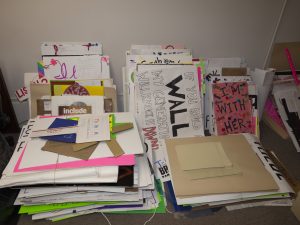Briggs, Grandgeorge, Hinderliter – Question 2
By
Martha Briggs, Catherine Grandgeorge, Alison Hinderliter
December 2017
2What particular opportunities and challenges do social-protest archives face?
Martha Briggs, Catherine Grandgeorge, Alison Hinderliter
Briggs: Lloyd Lewis Curator of Modern Manuscripts
Grandgeorge: Processing Archivist
Hinderliter: Manuscripts and Archives Librarian
– Newberry Library
¶ 1 Leave a comment on paragraph 1 0 Collecting in the moment via crowdsourcing gives us the opportunity to broaden the historical record by documenting the voices of individuals we have missed in the past when we have waited for materials to arrive as part of historical collections. In addition, we believe that this type of collecting publicizes the Newberry Library’s modern collections and collecting priorities, and highlights its interest in the activities of everyday people and the contemporary world. The Chicago Protest Collection thus helps us correct a common misconception that the library’s collections consist entirely of old and rare books and manuscripts.
¶ 2
Leave a comment on paragraph 2 0
 Figure 3. Unprocessed posters from Women’s Marches in Chicago and Washington, D.C. Newberry Library.
Figure 3. Unprocessed posters from Women’s Marches in Chicago and Washington, D.C. Newberry Library.
¶ 3 Leave a comment on paragraph 3 0 At the same time, archiving social-protest ephemera creates challenges for appraisal, arrangement, description, and preservation. While our aim is to be as inclusive as possible, we cannot save every physical piece that arrives at our doorstep. We will not retain moldy pieces that could harm existing library collections. Due to the costs of processing and storing archival collections, we may need to select representative items for some events. For instance, we will need to winnow the huge quantities of material that were saved for us by March for Science volunteers. Where possible, we will digitize posters that cannot be preserved in their original formats. We are also eliminating digital images that contain no protest content and that are obviously not created by the depositor. Because our protest archive is growing, we plan to arrange materials chronologically by event date but have not yet worked out the details. Consistent description of items like posters that may contain multiple slogans or only images will be difficult to implement. We also want to provide context for items by including donor information and narratives, and we want to connect digital content to physical content. Some items present challenges for long-term preservation not only because of the types of materials used—such as tape, glue, fabric, and glitter—but also for housing them, because they are often quite large and sometimes three-dimensional.
¶ 4 Leave a comment on paragraph 4 0 Chicago protests are primarily organized by left-leaning and progressive organizations. Thus far we have not realized our desire to collect materials from across the political spectrum. We need to figure out how to make ourselves and our aims known more widely, and we may need to be more actively involved in soliciting content from movements and individuals who might be suspicious of research libraries and other mainstream institutions.


0 Comments on the whole post
Leave a comment on the whole post
0 Comments on paragraph 1
Leave a comment on paragraph 1
0 Comments on paragraph 2
Leave a comment on paragraph 2
0 Comments on paragraph 3
Leave a comment on paragraph 3
0 Comments on paragraph 4
Leave a comment on paragraph 4